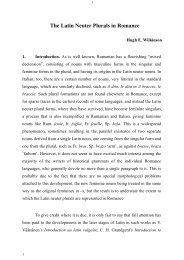THE STRONG PERFECTS IN THE ROMANCE ... - Page ON
THE STRONG PERFECTS IN THE ROMANCE ... - Page ON
THE STRONG PERFECTS IN THE ROMANCE ... - Page ON
You also want an ePaper? Increase the reach of your titles
YUMPU automatically turns print PDFs into web optimized ePapers that Google loves.
doing provides a valuable treasure-house of material. At first, in my<br />
reading of him, he takes a moderate standpoint, only claiming this<br />
pattern for a certain number of verbs for which the evidence is quite<br />
strong, but as he advances in his work he seems to get more and more<br />
carried away by his idea, until finally he is accusing all the arrhizotonic<br />
forms of the strong verbs in the Romance languages which show a special<br />
perfect stem of having been re-formed on the rhizotonic forms, which<br />
seems to me a plain case of twisting the facts to suit a theory. However,<br />
in spite of this, there does seem to me to be enough in his theory to<br />
warrant a closer examination.<br />
Such an examination requires a comparative study of the forms as<br />
they appear in the various Romance languages, and the quoting of<br />
innumerable examples. For the sake of conserving space I hope I may<br />
be forgiven if I do not give references for the forms quoted; these<br />
forms will, in many cases, be found fully documented by Dardel or<br />
Wahlgren, or else are the common property of the standard manuals, as<br />
listed at the end of Part III of this paper. Where I have supplied a<br />
reference, it will be because the source may not readily be found, and<br />
even here I will content myself with only the briefest of references,<br />
using abbreviations to direct the reader to the Bibliography. In<br />
principle I will give the earliest forms found in a language, but if I<br />
inadvertently quote a modern form — because it serves my purpose just<br />
as well — I crave the reader’s indulgence.<br />
We obviously need to start at the beginning and see what basis<br />
there is in Latin for such a theory, that is, we need to see if there is any<br />
evidence that the varying perfect forms found at the different stages of<br />
Latin were ever differentiated along the lines suggested by Dardel. In so<br />
doing it will be simplest to divide the verbs up into different classes<br />
4









